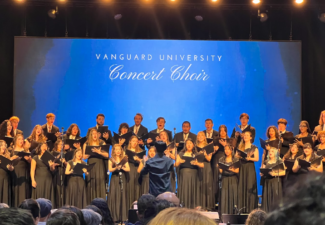Amidst COVID, college students working in isolation may turn to music in order to focus on schoolwork. As a result, when having to study either in the isolation of one’s dorm or room due to COVID restrictions, students may search for music that has a more positive impact on how they focus.
According to Vanguard University psychology professor Dr. Kim Sulki, psychology research shows that music can be distracting to those trying to study or work and diverts their attention from the task at hand. However, she recommended to listen to music without lyrics such as classical or EDM.
Dr. Sulki also stated “Music may be beneficial in that it affects a person’s mood. If a certain piece of music helps an individual feel happy or energetic, that can be quite helpful for someone needing a little boost while they are studying.” She also recommended taking a study break to listen to a favorite song and move around to reenergize oneself when feeling tired from studying.
Vanguard University music theory professor Dr. Robert Reno states that music theory is the study of the academics and structure of music, and in practice, is a mixture of harmony and form. This is true, especially in the sense of how it affects people mentally.
When looked at from a music theory perspective, music can be broken down to just a series of vibrations mixed into a pattern. However, these patterns have an effect on people mentally and physically.
So, how can this be applied to the way students work?
As a church worship leader, Reno realized that he could manipulate the way the congregation responds to the music through key sequences. According to Dr. Reno, there is a technical explanation for the way people feel music, as it is created to make them move or react in some way. He says when it comes to notes being played in music, people experience a tension when a series of notes is played, and they expect that tension to be resolved. It can either be resolved smoothly or unexpectedly, and both outcomes affect us differently, as the former will make listeners feel satisfied and the former will offer a sense of surprise in the listener.
This sort of surprise causes the listener to break their concentration on any outside tasks and instead focus on the music in the moment that the resolution occurs, so listening to music that has that sort of effect (mostly lyrical, rock, and hip-hop music) can break listeners’ concentration when studying. Therefore, it would be best to listen to music that instead incites smooth resolutions, such as that of classical music, low-fi instrumentals, and movie and video game scores.
Since COVID has had a major effect on how students live, their study habits may have changed due to being in isolation. The days of sitting in a coffee shop or Heath with a laptop are gone for the time being. So, it is best to find the necessary tools needed to study in the safety of one’s dorm or room (for those at home), and music itself may be beneficial.
Additionally, when asked if he feels music affects the way students think when studying, Dr. Reno said, “I believe it does only because people tell me it does. I never play music [when working] because music can never be background to me.” Dr. Reno does not listen to background music while he is doing work tasks because, as a composer and music theorist, it does not feel restful to him. Although, this leads to the question of what exactly students can listen to when it comes to studying, if silence is not beneficial to them.
Now, COVID may have an effect on the lives as students, but one can interpret it as a way to change how they work as students. Depending on the music one listens to, it is best to try not to get distracted. While everyone’s mind works differently, the most ideal ways to study may be in silence, listening to classical or instrumental music, or classical scores.


 Spring Concert: Music From Around the World
Spring Concert: Music From Around the World The Stigma of Korean Pop
The Stigma of Korean Pop Captivated: Vanguard’s Men’s Bible Study Group
Captivated: Vanguard’s Men’s Bible Study Group Things You Might Not Know About Vanguard
Things You Might Not Know About Vanguard
Leave a Reply